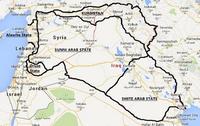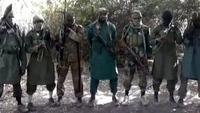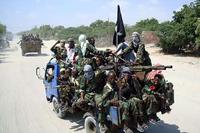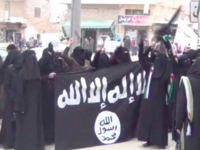-
Foreigners from 80 countries are joining ISIS on “unprecedented scale”: UN
A report by the UN Security Council has warned that foreign jihadists are swarming into Iraq and Syria on “an unprecedented scale” and from countries that had not previously contributed combatants to global terrorism. The report finds that 15,000 people have travelled to Syria and Iraq to fight alongside the Islamic State (ISIS) and other extremist groups. These volunteers come from more than eighty countries, the report states, “including a tail of countries that have not previously faced challenges relating to al-Qaeda.” ISIS is estimated to have more than $1 million in daily revenues from oil smuggling operations alone. It controls territory the size of Texas in Iraq and Syria, a territory which is home to between five and six million people, a population the size of Finland’s. The UN reports says that ISIS’s treasury also benefits from up to $45 million in money from kidnapping for ransom.
-
-
Dzhokhar Tsarnaev’s friend convicted of lying to police investigating Boston Marathon bombing
Robel Phillipos, 21, of Cambridge, Massachusetts, a friend of Boston Marathon bomber Dzhokhar Tsarnaev, was convicted yesterday (Tuesday) of lying to police during the investigation of the 2013 attack. Phillipos was convicted of two counts for lying about being in Tsarnaev’s dorm room three days after the attack, at the same time that two other friends removed a backpack containing fireworks and other related evidence from the room. The three friends went to Tsarnaev’s room while federal and local law enforcement units were engaged in an intense search for the bombing suspects.
-
-
Tunisia’s Islamist party Ennahda concedes defeat in Sunday’s elections
Tunisia’s Islamist Ennahda party, the first Islamist movement to come to power in an Arab country in the wake of the 2011 Arab Spring turmoil, has conceded defeat in Tunisia’s general elections held on Sunday. Ennahda’s main secular rival, the Nidaa Tounes party, is certain to emerge as the strongest force in the new parliament. Unlike the Muslim Brotherhood in Egypt, Ennahda did not try to turn Tunisia into an Islamist state and did not use its parliamentary majority to exclude non-Islamists from power. It opted for a coalition government with two secular parties, and participated in the writing of a new constitution which is regarded as the most progressive in the Arab world. Its mishandling of the economy, and a general anti-Islamist sentiment in Tunisia, doomed its hope of retaining power.
-
-
A framework for destroying ISIS and creating stability in the Middle East

In responding to the barbarism of ISIS, the United States must develop and articulate a political strategy that keeps America out of an inter-ethnic civil war, relies on local Arab armies to defeat ISIS, reduces Iran’s influence in the region, strengthens Israeli security, and prevents terrorist groups like ISIS from ever again establishing a political or geographic foothold in Syria and Iraq. The current U.S. policy of arming the overwhelmingly Shiite Arab Iraqi government army, the Iraqi Kurdish Peshmerga forces, and the hodgepodge Free Syrian Army is not going to achieve these goals. Instead, the United States should pursue a strategy based on diplomatically recognizing the already-existing partition of the region into its natural divisions — the “Five State” partition. The Five State approach aims to re-partition the two failed states of Syria and Iraq into more stable and cohesive states which will exclude Iranian influence, provide a stable and potentially powerful Sunni Arab state that can ally with the pro-Western Sunni Arab states, and accommodate the security concerns of the major regional non-Arab powers, Israel, Turkey, and the concerns of neighboring Russia.
-
-
Canada considering expanding powers of its security agencies
The Harper government is considering legislation which would expand the powers of the Canadian Security Intelligence Service (CSIS) to investigate, apprehend, and detain homegrown terrorists. CSIS wants the power to take advantage of the so-called “Five Eyes” spy network to which Canada, the United Kingdom, America, Australia, and New Zealand all belong. CSIS is also asking for more power to track Canadians believed to have been radicalized, and to take more advantage of anonymous sources. Ottawa officials are talking about whether to give CSIS explicit legislative permission to engage in “threat-diminishment” — a power which the intelligence agency’s watchdog recently pointed out that CSIS already uses, but the law does not explicitly permit.
-
-
Israel army in late August saved Irish troops from al-Nusra Jihadists on Golan Heights
Israel Defense Force (IDF) units on 30 August helped rescue Irish soldiers serving with the United Nations Disengagement Observer Force (UNDOF) on the Golan Heights. The rescue required the IDF to direct heavy fire at the Syrian Jihadists to prevent them from approaching the Irish contingent. The IDF, using its observation posts and aerial intelligence, guided the Irish soldiers so they could avoid concentrations of the heavily armed al-Nusra forces.
-
-
Five Britons go to Iraq, Syria every week to join ISIS: U.K. police chief
The Metropolitan police commissioner, Sir Bernard Hogan-Howe, the most senior U.K. police officer, has revealed that five Britons are travelling to Iraq and Syria to join Islamic State (ISIS) every week. Hogan-Howe spoke after it was reported that a third Jihadi from Portsmouth has been killed in the conflict. Hogan-Howe said that the figure of five Britons a week joining ISIS was a minimum and the “drumbeat of terrorism in the U.K.” was now “faster and more intense.” He added: “Those are the ones that we believe have gone. There may be many more who set out to travel to another country and meandered over to Syria and Iraq in a way that is not always possible to spot when you have failed states and leaky borders,” Hogan-Howe said.
-
-
Islamic State lacks key ingredient to make ‘caliphate’ work: eunuchs
Abu Bakr al-Baghdadi proclaimed Islamic State (ISIS) as a Muslim caliphate on 29 June 2014, with himself as caliph. Each of the earlier caliphates, however, had two features that ISIS lacks. First, ISIS has yet to establish a proper capital: A true state needs a central place to which taxes are paid and from which laws, regulations, and other administrative functions descend. Second, all previous caliphates relied on a special class of bureaucrats to provide stability and statesmanship. Those were eunuchs, who were unable to impregnate the women sequestered in the palace. As long as ISIS persists in beheading rather than castrating the males it captures, it has little hope of resurrecting a historic caliphate. Granted, ISIS is already acquiring women, but it has no-one to guard them for the caliph and no infertile functionaries to enact the authority of the state. While it has been less than a century since the fall of the Ottoman Empire, it is clear that a key concept for continuity with the great caliphates of the past has been lost. Simply stated, if ISIS doesn’t build a deeply fortified city and start producing eunuch bureaucrats, it will never have the stability and endurance of historic caliphates. The best it can hope for is to be recognized as a twenty-first-century predatory horde. If ISIS continues along its current path, it is likely to be remembered like the Vandals — that is, as murderous marauders who get brief mention in high school history classes.
-
-
Abrupt shift: Turkey allows Kurdish peshmerga to cross Turkish territory to help in Kobani’s defense

Bowing to intensifying U.S. pressure and growing domestic anger, the Turkish government, in an abrupt shift, announced yesterday (Monday) that it would allow Kurdish peshmerga forces from northern Iraq to cross Turkish territory on their way to defend Kurds in the besieged Syrian Kurdish border town of Kobani. In another development, the United States has decided to ignore objections by the new Iraqi government to the United States directly providing military aid to the Kurds, and yesterday air-dropped twenty-four tons of weapons and ammunition for the Kurdish defenders of the town in the first supply run the United States had made to the besieged town in nearly five weeks of fighting. Military analysts said the two moves could tip the military balance in favor of the defenders of the Kurdish town in their month-long battle against Islamic State (ISIS) fighters.
-
-
Turkey will not agree to U.S. support for Kurds fighting ISIS in Syria: Erdogan
Turkish president Recep Tayyip Erdogan said yesterday (Sunday) that Turkey would not agree to any U.S. arms transfers to Kurdish fighters who are fighting Islamic State (ISIS) militants in Syria. ISIS increased its pressure on the Kurdish city of Kobani, just inside Syria across the Turkish border, but Turkey views the PYD, the main Syrian Kurdish group defending Kobani, as an extension of the PKK, a pro-Kurdish independence group which, in 1984, had launched an insurgency campaign against the Turkish state – a campaign which, until it officially ended in 2012, had cost the lives of about 42,000 Turks
-
-
Egypt’s military involvement in the anti-Islamist campaign in Libya deepens
Two days ago, on Wednesday, Egypt has escalated its involvement in the battle against Libyan Islamists, as Egyptian warplanes conducted a series of attacks on Islamist militias’ positions in the eastern city of Benghazi. In late August, Egyptian and UAE warplanes attacked Islamist positions in and around Tripoli. Egypt’s growing direct military involvement in Libya has turned that country into yet another theater of a proxy war for broader regional battles, with Qatar and Turkey supporting the extremist Islamist militias while Egypt, Saudi Arabia, and the United Arab Emirates backing the militias’ opponents. The growing Egyptian involvement is an indication that after two years of introspection and confusion, the moderate forces in the Arab world have begun to assert themselves in an effort to gain a measure of control over post-Arab Spring developments in the region.
-
-
Boko Haram poses a serious challenge to the Nigerian government

The sophistication of Boko Haram’s operations including the prison break, use of propaganda, and the bombing of key government buildings has led some analysts to suggest that the group might be gaining help from al-Qaeda in the Islamic Maghreb, al-Qaeda in the Arabian Peninsula, or Somalia’s al-Shabaab; the Nigerian government, however, has yet to show any evidence of a connection between Boko Haram and other terrorist groups outside the country. Some Nigerian officials have already admitted that Boko Haram cannot be defeated on the battlefield. “Boko Haram (is) better armed and better motivated than our own troops,” Borno state governor Kashim Shettima said in February 2014. “Given the present state of affairs, it is absolutely impossible for us to defeat Boko Haram.”
-
-
Turkish jets bomb Kurdish positions
The tensions and acrimony between Turkey and the U.S.-led coalition fighting ISIS have risen to new heights in the last two days. No other country in the region bears as much responsibility as Turkey does for the rise and continuous success of ISIS, and on Monday, Turkey went a step farther in its effort to protect ISIS: Its air force conducted heavy bombing raids against targets of the Kurdish group PKK, one of the more capable Kurdish forces fighting to hold off ISIS and its advances. We should not assume that Turkey’s leaders, pious Muslims though they are, actually espouse or support the extremist version of Islam for which ISIS stands. Rather, Turkey sees ISIS as a tool which, if properly protected, and provided it does not get out of hand, can be used to harass, weaken, or even defeat Turkey’s main adversaries in the region. Turkey’s refusal to contribute to the weakening of ISIS is now running the risk of creating a humanitarian crisis of historical proportions: ISIS forces are closing in on the Kurdish town of Kobani, just inside Syria across from the Turkish border. ISIS has publicly announced that it will kill the 200,000-300,000 Kurdish citizens in the besieged city unless they converted to ISIS version of Islam.
-
-
Minnesota law enforcement helps Somali community fight radicalization, terror recruiting

For years, Minnesota’s Somali community has been battling the recruitment of young men and women into militant groups like al-Shabaab and the Islamic State (ISIS). Several community and religious leaders have helped form youth groups and held public discussions about the radicalization of Somalis in America. Law enforcement agencies are also playing their part. Andy Luger, U.S. Attorney for the District of Minnesota, is working with members of the local Somali community to better understand its concerns and how to help the community fight extremism.
-
-
ISIS and al-Qaeda use social media, Web platforms differently to achieve different ends

The Internet has contributed to the popularity of both al-Qaeda and the Islamic State (ISIS) among would-be jihadists, but the two terror groups use social media and Web platforms differently. Al-Qaeda has been spreading its message via the Internet for nearly two decades, while ISIS is a relative newcomer. Both groups use social media to recruit fighters, but ISIS has successfully developed content that Internet users are likely to share and repost. Such content in the form of violent videos and graphic imagery target young, disillusioned Westerners who are prime for radicalization.
-
More headlines
The long view
How Male Grievance Fuels Radicalization and Extremist Violence
Social extremism is evolving in reach and form. While traditional racial supremacy ideologies remain, contemporary movements are now often fueled by something more personal and emotionally resonant: male grievance.
